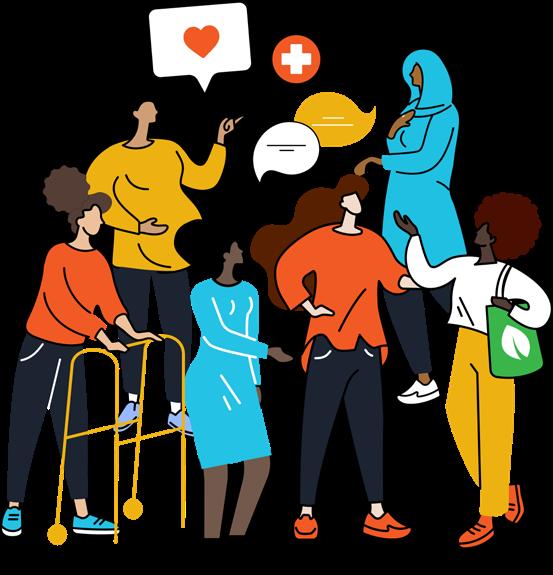

Refugee Women’s Health Community Consultation
Women from refugee and asylum seeker backgrounds share their experiences of accessing and navigating the Victorian healthcare system
FINAL REPORT – JANUARY 2024
Acknowledgement of Country
The Victorian Refugee Health Network acknowledges the Traditional Custodians of the lands on which we work across Victoria and pay our deepest respects to Elders past, present and emerging leaders. We recognise the resilience, strength and pride of Aboriginal and Torres Strait Islander communities.
About the Victorian Refugee Health Network
The Victorian Refugee Health Network (the Network) is an initiative committed to improving the health and wellbeing of Victorians from refugee and asylum seeker backgrounds. The Network provides a platform for collaboration, service coordination, training and resources and advocacy to address the health needs and challenges experienced by people from refugee and asylum seeker backgrounds.
Project team
This consultation and report was coordinated by Angela Keating and Samina Hassan. Further support was provided by Network colleagues Gavin Halge — Program Coordinator and Kristina Rienmueller — Sector Development and Policy Advisor, in addition to University of Melbourne Master of Public Health student Chloe Kennedy. The project had sponsorship from Network Executive Group members Chiedza Malunga and Kath Desmyth.
Definitions in this report
This consultation includes the experiences of women from both refugee and asylum seeker backgrounds. Under the 1951 Convention and Protocol Relating to the Status of Refugees by the UNHCR, refugee is defined as someone who is unable or unwilling to return to their country of origin owing to well-founded fear of being persecuted for reasons of race, religion, nationality, membership of a particular social group or political opinion (UNHCR, 2023). Someone seeking asylum is defined as who has fled their own country and applied for protection as a refugee (UNHCR, 2023).
The Network recognises the gender diversity and the unique experiences of trans, non-binary, agender and intersex populations from refugee and asylum seeker backgrounds. For the purposes of this consultation, the term ‘woman’ includes anyone who self-identifies as a woman or has experienced the healthcare system as a woman.
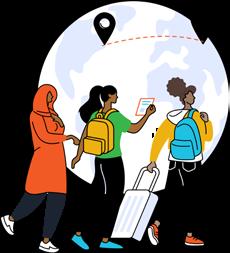
Acknowledgements
The Victorian Refugee Health Network would like to warmly acknowledge and thank all the women from refugee and asylum seeker backgrounds who were involved in this consultation. We thank you for the trust that you put in us to sit with you, to listen to your experiences and we hope that this report reflects our conversations together.
In particular, we would like to thank the Community Advisory Group. Your advice, expertise and time was crucial in shaping the design and outcomes of this project.
We also thank the organisations who co-hosted and/or supported the Community Consultations – Foundation House, Bendigo Community Health Services, Whittlesea Community Connections, Cultura and Uniting Asylum Seeker Program.
The Network would like to thank everyone who responded to our sector survey and the following organisations and people for participating in sector interviews - The Water Well Project, Multicultural Centre for Women’s Health, AMES Australia, Life Without Barriers, Asylum Seeker Resource Centre, The Royal Women’s Hospital, FARREP at Cohealth, GenWest and Cultura, Refugee Health Nurses from various metropolitan and regional organisations and General Practitioners (GPs) working at Utopia Refugee and Asylum Seeker Health Clinic, Cabrini Asylum Seeker and Refugee Health Hub, Cohealth and MyClinic South Yarra.
We acknowledge the financial support from the Victorian Department of Health and auspice support by Foundation House (The Victorian Foundation for Survivors of Torture).
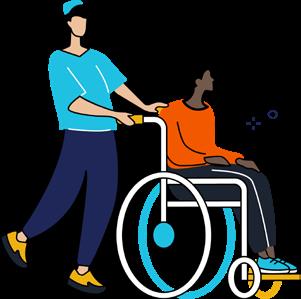
Executive Summary
Giving women’s health the focus it deserves includes taking the time to understand and respond to the needs of all women in the community, including women from refugee and asylum seeker backgrounds.
The Refugee Women’s Health Community Consultation aimed to better understand the specific challenges that women from refugee and asylum seeker backgrounds face in accessing and navigating healthcare services in Victoria.
Funded by the Victorian Department of Health and coordinated by the Victorian Refugee Health Network, this project aligned with the Network’s strategic priorities, including consulting and engaging community expertise to address health equity. Throughout this project, a Community Advisory Group comprised of 18 women provided ongoing guidance and advice – from identifying initial themes, to co-designing community consultations and co-presenting findings and recommendations to government representatives.
A rich diversity of identities and lived experiences were represented in this project, with over 50 women from refugee and asylum seeker backgrounds engaged through the Community Advisory Group and/or Community Consultations.
Women who had an experience seeking asylum were especially motivated to join, representing nearly 40% of all women consulted, including those currently living with no access to Medicare, income support or work rights. Women living in regional or rural Victoria also represented 40% of all women consulted.
Further, over 100 professionals from settlement, community and health organisations working directly with women from refugee and asylum seeker backgrounds were consulted through a survey or interview. They provided valuable insights into the systemic barriers, gaps in healthcare system navigation knowledge, workforce development needs and priority areas for policy and program development.
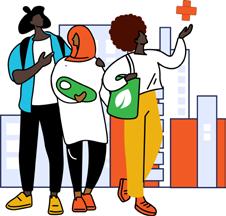
Overall, women shared that their settlement journey, gender, culture and religion significantly impacted their ability to prioritise their health and their pathway to access health services.
For women seeking asylum, conversations about health access focused on visas and Medicare ineligibility, which directly influenced their physical and mental health. These general findings emphasised the fundamental need to address social determinants of health across all levels of government in order to improve health equity for women from refugee and asylum seeker backgrounds.
Across the conversations, mental health and experiences of pain were the most common health issues discussed by women. Settlement, community and health professionals identified sexual and reproductive health and the health impacts of family violence as the next most pressing health issues for this group.
When exploring experiences of accessing and navigating health services in Victoria, findings and recommendations have been grouped under five themes:
1. Access & Equity
2. Rights & Information
3. Safety & Respect
4. Social Connection
5. Voice & Representation
Within these themes, women reflected the need for additional support to gain knowledge, understanding and confidence to assert their healthcare rights such as access, clear information, safety and respect. Women proposed recommendations focused on improving access to health appointments, health education within their communities and the model of care that they would like to receive in the healthcare system.
Women also shared the significant impact that social isolation has on their mental health and connections to the healthcare system. Interviews with sector organisations emphasised the importance of using social connection as a foundation for health education and a supported pathway to the wider healthcare system.
Lastly, as Community Advisory Group members Natalie and Fauzia reflect on in the following foreword, the project highlighted that women were motivated to be a voice for their communities, were seeking representation in the healthcare system and valued spaces to have their experiences heard.
The Victorian Refugee Health Network hopes that this report contributes to ongoing efforts to reduce health inequity and to improve access to healthcare in Victoria for women from refugee and asylum seeker backgrounds.
Foreword
We wanted to take part and to raise our voices.
We shared our lived experiences, our stories and the circumstances we have lived through. We gave a first hand narrative about what things are like, with our health and our experience of healthcare in Victoria. So many realities gathered to give us a clear picture.
As women, we tend to feel that if we prioritise our self-care, health and wellbeing that it is being selfish, but taking care of ourselves and prioritising health and wellbeing is not being selfish, it is being very sensible, because we can only pour from a full pitcher.
We want all the women around us to know where and how we can get the help we need - when we are feeling unwell, when we need medical assistance, when we need to feel okay and when we are feeling isolated. We want newly arrived women, those released from detention or living in community to know they should look after their health and know how to seek advice from services.
Sometimes we are unsure what healthcare services we can access. No one tells us if we are eligible or not and where to go. It can make us feel hesitant, overwhelmed, exhausted, neglected and self-pity. We
Written by:
keep postponing our health issues until we land in the emergency department.
We believe that someone must take initiative to come across and talk on behalf of women and our communities. The government might not know the reality about our healthcare, what it’s really like in Bendigo or Echuca. They should ask us what kind of services we want in our community. They must come between us and ask us. We know ourselves.
We are hopeful this project that we have all been working together on will be successful in providing the government an insight into our lives. They have the authority to make some wonderful things happen, there are some very simple changes to be made and to support women when they most need it.
If we were to distil everyone’s conversations, statements, real life experiences from this project, then it all boils down to adequate representation and a coherent, intelligent, smart and well-informed voice in our own healthcare.
To all the women who contributed to this project, thank you for creating a positive environment and to each and every one of you for creating a sense of belonging and a feeling that we mattered.
Natalie — Community Advisory Group Member, 40 years old, Pakistani, arrived in Australia 14 years ago, mother of two kids, a community volunteer and is passionate to take a lead to empower communities.
Fauzia — Community Advisory Group Member, a single mum who is passionate about work with the community, wants to advocate and represent women and their communities to see real change.
Background
Annually, Victoria welcomes approximately 4,000 people arriving on refugee and humanitarian visas and has more than 10,000 people seeking asylum living across the state (Victorian Department of Health, 2023).
Many people from refugee and asylum seeker backgrounds have higher rates of complex physical and mental health issues than other migrants, resulting from experiences in their home countries, countries of asylum and migration journey. These include but are not limited to:
• trauma and torture,
• deprivation and prolonged poverty,
• periods in immigration detention and;
• poor access to healthcare.
For women from refugee and asylum seeker backgrounds, additional health concerns arise from pre-arrival experiences including lack of access to and/or unfamiliarity about preventive health screenings, availability of appropriate sexual and reproductive healthcare and vulnerability to sexual and gender-based violence.
Research from across Australia shows that people from refugee and asylum seeker backgrounds underutilise healthcare services due to accessibility barriers, confusion in system navigation and health literacy. For women from refugee and asylum seeker backgrounds, this may be further impacted by gender, cultural and religious norms as well language and literacy barriers.
The Victorian Government recognises that refugees and asylum seekers are more likely to successfully settle when their health and wellbeing improves. Over the years,

As the Victorian Government’s Women’s Health and Wellbeing Program initiatives are implemented, it is imperative that there is direct consultation with and representation from women from refugee and asylum seeker backgrounds to ensure that their specific needs and challenges are addressed.
the Victorian Department of Health has taken a lead to address health inequity among refugee and asylum seeker populations through responsive, innovative and inclusive programs and policies. These include the specialised and targeted Refugee Health Program, funding to support health outcomes for people seeking asylum and the Hospital Access Policy, which aims to provide hospital care regardless of Medicare eligibility. Other mainstream initiatives such as the Priority Primary Care Clinics and Mental Health and Wellbeing Locals also have inclusion and access policies.
With growing evidence on the wide-ranging impact of gender inequality on healthcare access, women’s health is currently a focus of both Commonwealth and Victorian Government. The Australian Government’s National Women’s Health Strategy 2020-2030 identifies the need to break the ‘cycle of invisibility’ in existing data and address systemic issues in healthcare, such as women disproportionately experiencing delayed diagnosis and a failure to properly investigate symptoms. The Strategy also acknowledges the role of intersecting factors such as discrimination, socio-economic disadvantage, geographic location and residency status that act as a barrier to receiving timely and appropriate healthcare.
In 2023, the Victorian Government committed $153.9 million to the Women’s Health and Wellbeing Program, working to improve the health and wellbeing of women, girls, trans and gender diverse people across the state. This commitment particularly acknowledges the disproportionate impact of disease on women, especially conditions requiring pain management.
Grants to women’s health organisations to establish women’s health support groups
100 women’s health specialist scholarships
20 Women’s Health Clinics
9 additional sexual and reproductive health hubs
An inquiry into women’s pain management Mobile women’s health clinic
About the project
The Refugee Women’s Health Community Consultation aimed to better understand the specific challenges that women from refugee and asylum seeker backgrounds face in accessing and navigating healthcare services in Victoria.
The project was funded by the Victorian Department of Health and undertaken by the Victorian Refugee Health Network. For the purposes of this consultation, health services refer to hospital and health services, primary and community health, public health and mental health.
The consultation focused on listening, learning and being guided by the lived experiences of women from refugee and asylum seeker backgrounds, in particular experiences and reflections on their first five years in Australia.
The consultation aligned with Engage Victoria’s discussion guidance in 2023 for the Department of Health Women’s Health and Wellbeing Program, which aimed to understand the level of awareness and knowledge that Victorian women have about the healthcare system and their experiences when they access services to manage their women’s health conditions.
The independence of the Network was fundamental to ensure the project provided women confidentiality and safety, especially for those who may be fearful of or have negative experiences of government and/or concerns about their future eligibility for healthcare services.
The Network’s strong sector relationships also facilitated the consultation of professionals working in settlement, community and health services to contribute to the evidence base, particularly identifying systemic issues.
Approach
The consultation approach was informed by qualitative research methods and best practice lived experience principles. The project benefited from best practice guidance from the Network’s auspice agency Foundation House, including the Integrated Trauma Recovery Service Model and the Community Capacity Building Framework.
Key principles considered in the approach ensured a safe, accessible and supportive consultation with community members:
Trusted partnerships
Utilised sector and community networks to build upon established trust, especially important in a short-term consultation
Trauma-informed approach
Prioritised creating safe spaces, choices and control in participation and focus on shared connection and purpose
Planning
May & June 2023 Consultation July, August & September 2023 Reporting October, November & December 2023
Financial recognition
Provided honorarium for time and expertise to all women consulted, with a choice of direct bank transfer or gift cards
Rights based approach
Guided by a rightsbased approach using the Australian Charter of Healthcare Rights as capacity building
Community Advisory Group
A Community Advisory Group was established to advise on project design and implementation, identify emerging themes and create opportunities for community consultations.
The Community Advisory Group consisted of a group of 18 women who had lived experience of arriving as a refugee or seeking asylum in Australia. All women were approached and recruited through warm referrals from the Network’s existing stakeholder relationships. No previous experience was required – just a willingness, enthusiasm and commitment to the project goal of improving health access and navigation for their communities. Ability to communicate in English was not a requirement as interpreters were offered.
The Community Advisory Group exceeded expectations in attendance and engagement, with 75% of members attending over half of the meetings. Women expressed a strong desire to be a part of the group to:
• Share their experiences of accessing healthcare in Victoria
• Represent and elevate the needs of their communities
• Learn more about the healthcare system in Victoria
• Connect with women from diverse communities
Building safety, trust and connection was essential given the diverse backgrounds of women within the group and the sensitivity of conversations on health issues and visa status. This was fostered through a relaxed and informal style of meeting facilitation, encouraging catch ups between group members in break out rooms and prioritising phone calls to members between meetings, to allow additional sharing of personal experiences and feedback on the group discussions.
Overview of meetings:
1. Introductions
2. Levels of government and healthcare system in Victoria
3. Introduction to Australian Charter of Healthcare Rights
4. Impacts of gender, culture, religion and visa status on health access
5. Feedback on community consultation findings
6. Reflections
Throughout this report, individual Community Advisory Group members are introduced using their chosen name or initial and their own words to describe their backgrounds, expertise and skills.
I wish I knew more when I was an asylum seeker.
When you come from a different country, the services are very different. It’s very hard to integrate into organisations and health services. Now I am exposed to their problems and issues [working at a refugee and asylum seeker health service], I see that it stresses them out. It is my responsibility to work with this Advisory Group to find solutions.

Tahera — on her lived experience seeking asylum
Community Advisory Group
Member, mother, Hazara bicultural worker and social justice advocate
I’m hoping that our voice will be heard.
I’m hoping in the future that Mildura, and other regional and rural areas are not left out, so we can enjoy the same facilities, the same healthcare system that city people enjoy. Every person is Australia no matter what background, no matter what kind of culture, what kind of religion, everyone needs health prioritised in their life.

F. — on the importance of including rural and regional voices in consultations
Community Advisory Group
Member, Malaysian, Muslim, mother and homemaker who has been living in regional Victoria for 9 years
Community Consultations
Community Consultations aimed to provide an opportunity for a wider group of women to share their experiences on healthcare access and navigation across Victoria.
Each member of the Community Advisory Group was consulted about links to existing women’s groups in their communities and through this, five diverse groups were identified for face-to-face consultations. The Community Advisory Group members linked to these groups supported the project team by co-designing and co-hosting the meetings in spaces that were local, familiar and comfortable. Host organisations provided generous inkind support, which included advice, promotion and room bookings. This approach was essential in building upon established trust and safety for once off consultations.
Consultations included:
1. Tibetan refugee women in Footscray
2. Karen refugee women in Bendigo
3. Newly arrived women from Afghanistan in Geelong
4. Women seeking asylum based around Epping
5. Women seeking asylum linked to a group in Brunswick
After being tested in the Community Advisory Group, the Australian Charter of Healthcare Rights provided a starting point for discussion. Attendees were asked to share positive and negative experiences of rights to access, safety, respect, partnership, information, privacy and feedback in the healthcare system. The project team was able to use draw upon the emerging themes from the Community Advisory Group to prompt further depth and breadth of experiences.
Mixed facilitation methods, interpreters and close collaboration with co-hosts supported women with varying levels of literacy, comfort of the consultation process and knowledge of the healthcare system in Victoria.
Some of the women had no idea how to give feedback. Now they know they have the right to give feedback.
One woman was worried that something was going wrong with her and the government will know, but we explained to her that the government wants to learn from her experience. If they didn’t give feedback, we wouldn’t know how to improve the health system. Because I am a Support Worker here, they trust me.

Boe —on her experience of cohosting a community consultation in Bendigo
Community Advisory Group Member, Karen, happy to help her community, and works to make good connection and relationships with other communities
When they know their experience can change the system, then they are happy to talk.
Coming to Geelong, it was important. There are a lot of refugee women here and they can share their experience, tell the government and hope it will help to change the healthcare system. I tell them your experience can change other’s experiences. One woman said, “I just talked about one experience, but I have many experiences”. They needed more time to talk.

G.R. — on her experience of cohosting a community consultation in Geelong
Community Advisory Group Member, 30 years old, refugee, has lived in India, patient and would love to do nursing course
women from refugee and asylum seeker backgrounds engaged in consultation, including:
Community Advisory Group Members
women who attended Community Consultations
19 Communities represented:
• Afghan (Dari speaking)
• Afghan (Hazara)
• Chin
• Ethiopian
• Fijian
• Indian
• Karen
• Lebanese
• Malaysian
• Pakistani
• Palestinian
• Persian
• Rohingya
• South Sudanese
• Sri Lankan (Sinhalese)
• Sri Lankan (Tamil)
• Syrian
• Tibetan
• Ukrainian
Sector Consultations
Consultations with professionals from settlement, health and community organisations further supported the evidence base gathered from women with lived experience.
An online survey was shared with the Network’s monthly e-bulletin subscribers and directly with key stakeholder groups. This short 10 question, 10 minute survey allowed for busy sector professionals to contribute and comment on their experiences referring to or providing healthcare services to women from refugee and asylum seeker backgrounds.
One-hour online interviews conducted either individually or in small groups allowed case managers, bicultural workers, bilingual health educators, Refugee Health Nurses and GPs to share in-depth and localised experiences about their work supporting women from refugee and asylum seeker backgrounds.
Feedback collected identified systemic barriers, gaps in knowledge by women about healthcare system navigation, workforce development needs and priority areas for further funding.
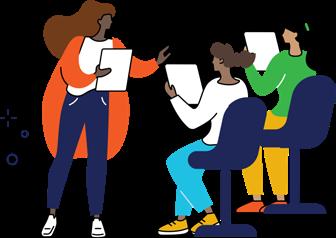
Sector survey respondents
Findings and Recommendations
Overall, women shared that their settlement journey, gender, culture and religion significantly impacted their ability to prioritise their health and their pathway to access health services. When exploring experiences of accessing and navigating health services in Victoria, findings and recommendations have been grouped under five themes: Access & Equity, Rights & Information, Safety & Respect, Social Connection and Voice & Representation.
Impact of settlement on healthcare access
All women recognised that the journey of migration and resettlement in Australia had a significant impact on their health, navigation and access to healthcare services. Conversely, the quality of their physical and mental health significantly impacted settlement outcomes for themselves and their families. Conversations around accessing health services focused heavily on social determinants of health linked to their settlement journey, such as income support, housing, food insecurity, job security and access to basic services, especially those determined by visa status.
Starting life from zero is hard, we do our best, but it puts us in stress.
Here the culture is different, the system is different. When we are talking about health, we are not just talking about physical health, there is also mental health, there is too much pressure. Women who have families, at least they have someone to talk to, (but for single women), with whom we share ourselves? Everything is on us, every responsibility, every expense and management. Even if we want to make our health a priority, this situation doesn’t allow us to have peace of mind.

Toba — on her experiences of arriving in Australia as a single woman
Community Advisory Group Member, 29 years old, single, hard worker, passionate, and from Afghanistan
Newly arrived refugee women spoke about the stress and pressures of building a new life in Australia – securing affordable housing, managing a budget on Centrelink payments, understanding new systems and language barriers. While settlement services offer health orientation sessions to new arrivals, it was clear this was limited and/ or got lost amid the stress of the first months after arrival. Consultations with settlement services case managers and Refugee Health Nurses acknowledged the workload pressure of supporting healthcare access and navigation needs of newly arrived women.
For women seeking asylum, conversations about health access were centred around immigration, visa restrictions, past experiences in detention, precarity of waiting on a temporary visa and surviving on little or no income support, noting that ‘visa impacts everything’. Those without, or with insecure, Medicare eligibility faced significant stress in accessing healthcare. In addition, experiences of discrimination and rejection from healthcare services based on visa status seeking asylum were also commonly shared.
Insights from the sector emphasised the impact of systemic barriers on a woman’s access to health services. Services supporting people seeking asylum shared the same frustrations as the women consulted, on the significant stress, confusion and disadvantage for women accessing healthcare without Medicare. Many sector respondents, in particular GPs, were clear the root cause of most healthcare access and worsening health conditions for women seeking asylum was visa status. This indicates that addressing the social determinants of health across all levels of government is fundamental to improving health equity.
The visa affects mental and physical health. When I’m stressed, every time immigration rejected me, my asthma is worse. When they don’t respond, we get sick. Community Member
If you went 5-10 years without a visa, your life is gone, your health is gone. Community Member
With immigration system, people have been waiting for really long periods of time. People are battle weary, they feel unseen, unimportant, they feel like they are not seen as humans.
General Practitioner
visa framework makes it incredibly difficult for women. It adversely impacts their health while denying or limiting their access and exposes them to ongoing precarious status and fear.
Community Lawyer
They’ve waited so long [for a visa] and they’ve developed this pain syndrome, then they get their visa and they’ve still got the pain because that’s already worked into their system.
General Practitioner
The
Impact of gender on healthcare access
Despite recognising the importance of taking care of their own health, all women agreed that they often prioritised others needs above their own. Gender or cultural norms, religion, family and household responsibilities and financial stress impacted how they managed their own health. In particular, those arriving as single women or single mothers spoke about the stress of managing everything alone and lacking support networks that might have been more readily available in their home countries. Barriers to family reunification further added to this distress.
Sector consultations emphasised how crucial the health and wellbeing of a woman was in the broader family or settlement context and revealed the need to explore the impacts of gender-based, family and sexual violence on health access.
Experiences of the healthcare system in Victoria
Women shared diverse experiences when accessing and navigating the Australian healthcare system. Experiences ranged from positive to negative and impacted women in many ways. The words below were most commonly heard throughout the consultations to describe how they felt.
We are not thinking about ourselves. We are giving priority for our kids, our family first and we are at the bottom.
Community Advisory Group Member
In our culture, health is not a priority. We never learn from our mothers.
Community Advisory Group Member
I think as women culturally and religiously, we put our health last. We give give give, serve, serve, serve and now we are run down.
Community Advisory Group Member
If the woman in this situation crashes down, then her whole family does too. Their whole settlement journey does too.
General Practitioner
In the presence of her husband or another family member, this woman was too scared to say [what she needed], fearing the brutal consequences at home.
Bilingual Health Educator
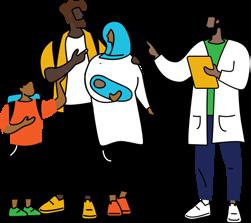
You feel hopeless. It feels like the end of the road.
Community Advisory Group Member
It’s a big move, we are starting from scratch, we’re already anxious, we need a lot of support.
Community Advisory Group Member
We are always waiting, it is too hard.
Community Advisory Group Member
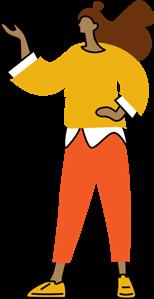
Maybe I am lucky because so far, I don’t have any problem with anything during my journey.
Community Advisory Group Member
Many women are alone - that is really difficult. If you are sick, there is no one.
Community Member
Theme 1: Access & Equity
What we heard:
My hope is fairness in the health system – regardless of chance, poverty or visa.
Some women don’t have their driving licence and are hardly going out. Some are busy mums who find it hard prioritise their health. If someone can organise a pop-up women’s health clinic, close to bus stops, maybe at the playground, the library, market, or school, more women will come. When I was working in the family planning clinic in Sri Lanka, they had a low-cost women’s health clinic with blood tests, breast checks, and pap smears. We found four or five breast cancers early.

Krishanthi — on how to address women’s access barriers to healthcare
Community Advisory Group Member, Sri Lankan, volunteer community worker, group facilitator and passionate to make changes
Women have said that they’re too scared to approach the GP and too ashamed to say they can’t afford it.
Bicultural Worker
The Refugee Health Nurse appointment is too late. [My friend] didn’t ever have an appointment. There were too many arrivals into Australia at that time.
Community Advisory Group Member
I can’t pay that, I can’t afford it, I rather stay at home.
Community Advisory Group Member
Accessing health services is very hard without Medicare. For three years, I didn’t go for GP consultation.
Community Member
Our first person in contact was the Refugee Health Nurse. She was the one who took information about our past, present and head to toe examination. My source of information was her, I got to ask her questions. But it’s not enough, one appointment is not enough.
Community Advisory Group Member
Their own health needs are left to the side because they need to bring the children with them. A lot of the time I’ve seen women turned away, come back when so and so’s at childcare, but childcare is a barrier as well.
Social Worker
Waiting for appointments makes me disappointed, I cry on the way back.
Community Member
In health services, not everyone understands visas and it’s not important for them.
Community Member
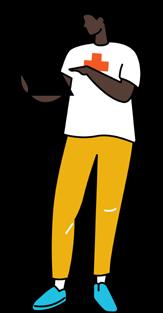
Theme 1: Access & Equity
1.1 Create accessible pathways
What we learnt:
Many women shared barriers to accessing healthcare services including:
• financial barriers due to ineligibility for mainstream safety net supports including income support, Medicare and subsidies
• transport barriers due to limited public transport links, no driver’s license, no car and/or disability or mobility
• childcare barriers due to lack of family and social networks and/or ineligibility for childcare subsidies
What we recommend:
Commission pop-up or mobile refugee women’s health clinics specialised in refugee health to be regularly located in high settlement, outer-suburban metropolitan areas, promoted through existing, trusted health and community services and with bicultural workers and interpreters to assist on the day.
Provide brokerage for transport options to attend health appointments, including taxi vouchers and referral options to established Community Patient Transport services to be provided by the Refugee Health Program and Women’s Health and Wellbeing Program.
Provide funded occasional childcare, supervised playgroups and/or child-friendly options on site or in close proximity to Refugee Health Program and Women’s Health and Wellbeing Program to support women with children to attend health appointments.
1.2 Enhance specialised primary care
What we learnt:
Women had mixed experiences with GPs in initial appointments after arrival - finding it too rushed, not skilled in refugee health and/or that it was confusing or not well coordinated with Refugee Health Nurses.
Women felt very positively about appointments with Refugee Health Nurses and said they would benefit from their continuous care to address women’s health concerns.
Many women relied on and felt a strong continuity of care within specialist refugee and asylum seeker health clinics, which provided integrated care between GPs, nurses and allied health.
What we recommend:
Provide formal incentives to GPs to upskill in refugee health, which would increase availability and quality of GPs able to provide Comprehensive Health Assessments and continuity of care, including during surge periods.
Increase resourcing for Refugee Health Nurses to specialise in women’s health and provide ongoing and focused care, including warm referral to the Women’s Health and Wellbeing Program for longer term needs.
Ensure sustainable and increased funding for specialist refugee and asylum seeker health clinics, to stabilise their services and extend access to underserved outer suburban areas.
Theme 1: Access & Equity
1.3 Increase understanding of service eligibility
What we learnt:
Many women seeking asylum felt frustrated when frontline healthcare staff did not understand their visa, which often resulted in being turned away while in pain and distress.
Many women seeking asylum were not aware of healthcare services they could access without Medicare, often self-managing their condition and/or presenting at emergency departments.
What we recommend:
Provide training and easily accessible instruction resources about the ‘Victorian Hospital Access Policy’ and other services available to women seeking asylum to all healthcare frontline workers, finance departments and the Women’s Health and Wellbeing Program.
Increase promotion of healthcare services that are available to women ineligible to Medicare, such as Women’s Health and Wellbeing Program, Priority Primary Care Clinics and Mental Health and Wellbeing Hubs, among women from asylum seeker communities.
42%
We can be flexible to the women’s needs.
Our women’s health clinic probably works well because we are flexible - like people can bring their children. We are not telling them ‘’you have to find someone to watch them to come to your appointment”. If they really can’t get public transport because of literacy or mobility, we will organise a taxi, an Uber, or MYKI top ups.
Bicultural Worker — on supporting access to a women’s health clinic
of sector survey respondents identified ‘targeted or prioritised health services for women from refugee and asylum seeker backgrounds’ as the top priority to better support women to access the health services

Theme 2: Rights & Information
What we heard:
If she had a female interpreter, she would feel more comfortable to share, to tell the truth.
A woman I know was at risk of having a premature baby. She couldn’t get a female interpreter. The doctor was asking “how do you feel in the stomach, in the pelvic areas?”. She didn’t feel comfortable in front of a male interpreter, her husband doesn’t speak English, they are newly married and he doesn’t know anything about pregnancies or babies. She was scared, shy and not sharing some information would be a risk for her.

A.K. — on the importance of having access to female interpreters
Community Advisory Group Member, Rohingya woman who arrived in Australia in 2009, mother of four, has worked as an interpreter in medical settings and passionate about helping women in the community
There’s a lot of good services, but most women don’t know about these services.
Community Advisory Group Member
I remember the first appointment in Australia, I had no idea what they were injecting into us.
Community Advisory Group Member
When they stop their periods, around 45 or 55, changes are coming in their bodies. They didn’t know what they should do. There is a lack of information. In our culture ladies never share their pains with each other.
Community Member
If you are asking women to do the online booking, they don’t know what Google is to go and search for things. They don’t pick up the phone to make an appointment. They are mostly relying on their husband or their children.
Settlement Case Manager
For new arrivals, they receive a letter about the cervical cancer self-collection test. I haven’t done it because in our religion, when we are girls and not married, we should not put something inside. I’m scared.
Community Advisory Group Member
For most of us, we never see a doctor in our life unless we are really, really sick and never had a family doctor before so we just have no idea.
Community Advisory Group Member
The interpreter is yelling at her, she feels tension, she feels nervous. She is worried that the doctor will think she is a bad person.
Community Member
The interpreter didn’t want to interpret things because she was too embarrassed to say what the service user was saying to me and she didn’t want to repeat it. That increases the shame and now [the client] has not been back.
Social Worker
Theme 2: Rights & Information
2.1 Strengthen health education
What we learnt:
Women shared health education needs including:
• not being aware of and/or not feeling like they could use their healthcare rights, which led to negative experiences of access, safety, respect, decision, information, privacy and feedback
• not feeling confident to have open conversations with healthcare staff, due to gender-based, cultural and language barriers
• not having experience in giving feedback or feeling scared to give feedback fearing that it would impact their visa
Women felt health orientation sessions offered by settlement services were not comprehensive and were provided too early in their settlement journey, however did not know where to access women’s health education when they were ready.
Women felt confused and stressed by current preventive health communication, which resulted in avoidance and delays in timely preventative care.
2.2 Improve interpreter services
What we learnt:
Many women spoke of issues related to interpreter use, including not being offered an interpreter, inaccurate medical terminology interpretation and/or being shamed, frightened or disrespected by interpreters.
What we recommend:
Ensure health education programs include the following topics to improve health knowledge and healthcare system navigation for women from refugee and asylum seeker backgrounds:
• healthcare rights
• health system navigation (including women’s health and mental health services)
• communicating with healthcare professionals
• giving feedback
Strengthen partnerships between settlement services and established health education providers, to streamline referral pathways to ongoing, stepped and regular health education programs for women from refugee and asylum seeker backgrounds.
Review existing resources on preventive women’s health screenings to identify gaps and develop simple, in-language resources that can be widely distributed. Resources should include knowledge about the body, what to expect, access and eligibility across age groups.
What we recommend:
Increase professional development incentives available for interpreters to upskill in practice standards, including healthcare rights, medical terminology for women’s health issues and trauma-informed practice when working with women from refugee and asylum seeker backgrounds.
Ensure policies and practices promote the consistent use of interpreters in Victorian healthcare services to ensure an accessible healthcare system that provides clear information and high-quality care.
Theme 2: Rights & Information
2.3 Support system navigation
What we learnt:
Many women expressed interest in a health triage hotline that was available 24/7, in language, could understand their experiences and could provide advice on health issues and health system navigation.
Women valued female Bicultural Workers as culturally safe and trusted sources of information. Sector insights indicated insecure funding, limited training and lack of responsiveness to new and emerging communities as challenges in employing a bicultural workforce.
Women often felt confused by online booking systems, SMS reminders for medical appointment and preventive health reminder letters, due to language or digital literacy barriers.
What we recommend:
Increase accessibility and awareness of existing health triage hotlines (including Nurse On Call, 1800 My Options, Maternal and Child Health Line) by ensuring culturally safe and trauma informed practice standards for hotline staff and targeted, inlanguage promotion and partnerships with settlement services.
Ensure sustainable funding, training and support for female bicultural workers, within the Refugee Health Program, community health and Women’s Health and Wellbeing Program to support ongoing system navigation, health education and referral pathways.
Further invest in digital solutions for translated appointment booking systems including for women’s health screening reminders, to allow them to be received in chosen language and written or audio format. Digital solutions should also consider investment in digital access and literacy for women from refugee and asylum seeker backgrounds.
The whole family received letters of needing pap smears and breast screens.
They had just arrived and they came to saying “What is this? I don’t understand, it’s not my language and I’m illiterate. I can’t read this”. There’s a lot of information that gets delivered that just causes more confusion.
Settlement Case Manager — on preventive health promotion for women from refugee backgrounds
80%
of sector survey respondents identified ‘limited health literacy’ and ‘limited understanding about navigation of the Australian healthcare system’ as challenges that impact access to the healthcare system for women from refugee and asylum seeker backgrounds
Theme 3: Safety & Respect
What we heard:
We need to have equal rights, to be treated well, with patience, with respect.
People who are new in a country, they are already having a lot of issues and if the GP doesn’t treat them well, they lose their confidence more and they will not be safe. I had a friend who said “even if I’m dying I will not go to an emergency room”. That’s why it’s so important to be treated with respect.

S.K. — on the importance of safety and respect in healthcare
Community Advisory Group Member, artistic, compassionate, considerate, benevolent, empathetic
They treat us based on our looks, I can feel it.
Community Member
Your leg is shaking. Your body is not feeling safe or comfortable.
Community Member
I think for women in general pain gets dismissed. But women of different cultures express pain differently and it either means they get dismissed because they’re too expressive or they don’t express it at all. General Practitioner
I think there is one community liaison worker, but he is male. There is no female worker, who can speak English and can help us access the services.
Community Member
Why open my heart again? I am not wanting to recount the trauma and the sad story. It’s on the file and in the computer. Leave respect for me.
Community Member
The staff who are working at the hospital, they are not patient, they are very fast and we ask them to repeat, then they say “I can’t” but then I can’t get the information.
Community Advisory Group Member
When I say to newly arrived clients who are Arabic speaking that I have an Arabic speaking doctor that I can take you to, the relief on their face is palpable.
Settlement Case Manager
Some people are very good and genuine. It can make a big difference when you feel safe.
Community Member
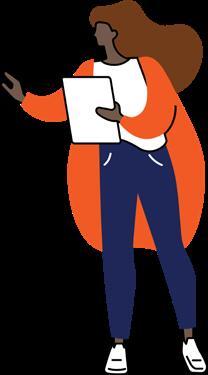
Theme 3: Safety & Respect
3.1 Ensure trauma-informed care
What we learnt:
Women felt more comfortable to share their life experiences and health issues when health practitioners took the time to create a welcoming, patient and validating experience.
Many women felt unsafe when health practitioners did not understand the impact of their refugee experience, gender, culture and religion on their access and navigation of the healthcare system.
Many women, particularly women seeking asylum, felt retraumatised and/or distressed when they were requested to repeat their life experiences or visa status to different healthcare workers.
Some women felt uncomfortable when they did not have access to female health practitioners, particularly in emergency and primary care.
What we recommend:
Ensure trauma-informed care is embedded into workforce training across the whole healthcare system, particularly in practices which provide increased consultation time within frontline healthcare services.
Develop a professional learning module to equip health practitioners to better support women from refugee and asylum seeker backgrounds in the healthcare system, including best practice findings and the voices of lived experience, that can then be offered to the Women’s Health and Wellbeing Program and wider healthcare services.
Promote use of My Health Record and strengthen record keeping practices among individual health providers and the wider healthcare system, so that health history and eligibility information provides safe experiences of continuity of care.
Explore models of care that ensure safety and support for women when female health practitioners are not available, particularly in emergency and primary care services, such as allowing for women to engage support persons (e.g. bicultural workers, family members, companions) and/or providing communication briefs for health practitioners.
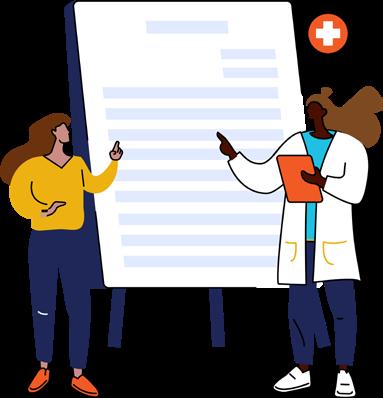
Theme 3: Safety & Respect
3.2 Understand experiences of pain
What we learnt:
Many women felt misunderstood when seeking help for pain, leaving them to self-manage their condition and negatively impacting their trust in the healthcare system.
Many women shared that experiences of women’s pain were not talked about within their families and communities which led to hesitancy, stigma and confusion in seeking pain management.
What we recommend:
Ensure women from refugee and asylum seeker backgrounds and Refugee Health professionals are included in the Inquiry into Women's Pain, to understand how their unique experiences impact their presentation, management and expressions of chronic and acute pain.
Develop a professional learning module to equip health practitioners to better understand pain experienced by women from refugee and asylum seeker backgrounds, including best practice approaches and the voices of lived experience.
Explore health promotion strategies to increase understanding and options for managing women’s pain among refugee and asylum seeker communities, including to girls and young women to ensure early intervention.
There are a lot of things that end up costing the healthcare system more in the long run.
The system is geared towards short, sharp consults. For refugee women, I see that really penalising them and they struggle to find good continuity of care. Talking about women’s pain, for example endometriosis, you really want to catch it early, not to become this long aggressive disease that causes pain, infertility and disability.
If you can have the patience with someone to listen to their story, it helps you navigate that so much better, because you understand what is happening for that person, where they’ve fallen through different gaps, what is shaping their experience, illness, wellbeing and care.
General Practitioner — on the systemic challenges in providing care for women from refugee backgrounds
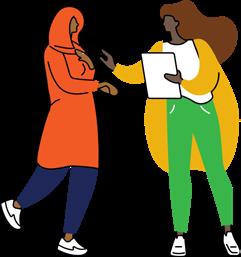
60%
of sector survey respondents identified ‘cultural impacts such as racism, discrimination, stigma and taboo’ as a challenge that impacts access to the healthcare system for women from refugee and asylum seeker backgrounds
Theme 4: Social Connection
What we heard:
Even if we have a house full of people, we are still alone all by ourselves.
We need to have a platform like this to share women’s health experiences and discuss our own opinions, even if we are different. I love to be here as a housewife. I usually don’t open up so it’s good to hear people talk so confidently.

U.J. — on her experiences of connecting with other women through this consultation
Community Advisory Group Member, busy mother with kids, Muslim woman from India seeking asylum in Australia for past 14 years and enjoys participating in advisory groups
I came to Australia alone, everything is on me.
Community Advisory Group Member
I’ve never experienced stress and such a hard time before coming to Australia. I cry every day.
Community Member
Women have big stigma in our culture. They don’t want to see a psychologist, a psychiatrist, they don’t want to take medication. And it affects their life and their families.
Community Advisory Group Member
Women are motivated to come because they need food bank or housing and then they’ll come to us [at the women’s health clinic] because they’re here already.
Bicultural Worker
When someone asks “how are you?”, we start our story. I feel good when someone asks me “how are you?” Community Member
Being a single refugee mother would be probably one of the most difficult things to ever happen to someone.
General Practitioner
I was in and out of hospital. I’m a single mum, sometimes the situation becomes very precarious. I was struggling with so many things because I don’t have any family here.
Community Advisory Group Member
We really just need reforms that understand that mental and physical health are intimately connected and we need to give people opportunities to address both in tandem.
General Practitioner
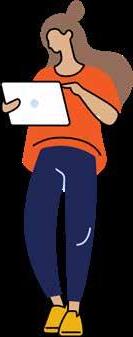
Theme 4: Social Connection
4.1 Build community links
What we learnt:
Women were more likely to access health services co-located at community hubs that connect them to a range of supports such as foodbanks, casework, family services and social groups.
Newly arrived refugee women experiencing social isolation, culture shock and poor mental health felt supported when linked to women from similar cultural, religious and language backgrounds.
Many women described women’s groups as important in reducing isolation and building confidence in health conversations, noting that online meetings were accessible and convenient.
What we recommend:
Ensure Women’s Health and Wellbeing Program initiatives build partnerships with existing community hubs well utilised by women from refugee and asylum seeker backgrounds, to build upon a place-based, whole of family model of care.
Strengthen referral pathways between newly arrived refugee women and established women’s groups in the community, to address social isolation and increase future engagement with health education and services.
Ensure sustainable and increased funding for face-to-face and online Women’s Health and Wellbeing Support Groups that target women from refugee and asylum seeker backgrounds, acknowledging the time it takes to build a foundation of social connection.
We start with social connection and then dig deep to find their needs.
They talk to each other, come up with ideas about how they can improve their health and then we can see how we can support them. The thing is there is not a period of time for our connection. They own their group; they build on it. It doesn’t matter how many flyers or emails you send, if the groups organise themselves, the session will fill up. They do it because they come for each other, not for me.
Health Educator — on using social connection as a foundation for health education
Everything that is online, I love it.
You’re at home, you don’t need to travel, you don’t need push yourself. Just you click and you go in. Most of the women need to know more, know community, how they can talk to someone and help them with anxiety. If they can come to the meeting and find each other, maybe they can find something useful.

M.S — on her experiences joining online meetings for social connection.
Community Advisory Group Member, Kurdish from Iran and Iraq, Christian, likes communicating with people from different cultures, likes walking and dancing
Theme 4: Social Connection
4.2 Explore mental health support
What we learnt:
Many women described mental health challenges such as anxiety and depression and were unsure of where and how to access support due to isolation, stigma and cultural safety.
Mental health for women is one of the top concerns that we see and it’s really hard to get access to anything for this group.
There’s a huge lack of female psychiatrists, psychologists or counsellors and specifically in language. I don’t know if there’s anything around mental health in the [women’s health] reforms but there could be a women’s specific mental health service with cultural awareness and like-minded people.
Bicultural Worker — on the gaps of mental health support for women
What we recommend:
Review recent findings of Diverse Communities Mental Health and Wellbeing Grants and other relevant consultations, to benchmark best practice in providing and promoting accessible and culturally safe mental health services for women from refugee and asylum seeker backgrounds.
Explore potential models of care to reach women who are isolated, including community volunteer visitor schemes, hotline services and peer support programs such as Partners in Wellbeing, providing companionship as a foundation for linkage to mental health services.
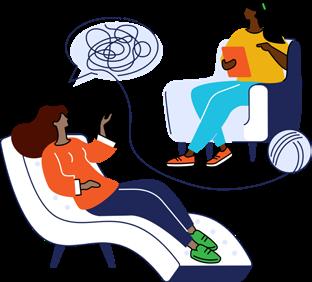
89%
sector survey respondents identified ‘mental health and wellbeing’ as the top health concern for women from refugee and asylum seeker backgrounds
Theme 5: Voice & Representation
What we heard:
I would like the government to know that refugees are skilful. Please invest in them, see their skills and accept them fully.
I work as a Refugee Health Nurse and really enjoyed it, because I share the same pain as the patient who is sitting in front of me. Everybody speaks fast as they need to get jobs done, but when you are a refugee yourself you understand it takes time and a lot of patience. Scholarships are always given to ICU nurses, cardiac nurses and emergency nurses but what about Refugee Health Nurses? I could be the change.

Karma W — on how the government can invest in employing refugees in the healthcare workforce
Community Advisory Group Member, 30 years old, Tibetan, refugee, mother and Registered Nurse
This is the first time someone has asked me about my experiences.
Community Advisory Group Member
Women in our community are very shy and I would like to be a voice for them.
Community Advisory Group Member
Sometimes as a refugee I’m scared to give feedback. Everyone is scared and quiet, [because we think] this not good for visa.
Community Member
Half of the anxiety, stress, worry, apprehension, it subsides when you see a familiar face from your culture, speaking your language and you already feel taken care of.
Community Advisory Group Member
If we share our experiences, we feel lighter.
Community Member
We can help the people coming after us.
Community Member
The best way is talking to us, women from different communities, to share ideas, challenges, anything we need, anything to change, worth paying attention to.
Community Advisory Group Member
Our community is very small, sometimes we are forgotten.
Community Advisory Group Member

Theme 5: Voice & Representation
5.1 Engage community voices
What we learnt:
Women expressed they needed more time in this consultation to fully discuss their experiences, acknowledging the time and safety required to share the breadth, depth and sensitivity of women’s health issues.
Women shared health access and navigation issues impacting their whole families and asked for further opportunities to be able to provide feedback.
Many women who were Community Advisory Group members were interested in continuing their advisory role on an ongoing basis.
What we recommend:
Invest in additional consultations on health access and navigation for women from refugee and asylum seeker backgrounds to build a stronger evidence base, particularly for sensitive health issues such as sexual and reproductive health and targeted consultations with younger and older women.
Invest in additional consultations on health access and navigation for refugee and asylum seeker backgrounds taking a whole-of-family approach, including men’s and children’s health.. Consultations should be at least 9 – 12 months to ensure relevant depth and breadth.
Provide funding for an ongoing Community Advisory Group at the Victorian Refugee Health Network, which could sit alongside the current Executive Group of health professionals to provide ongoing strategic direction, oversee the Network’s activities and enable links to the community for further consultations.
5.2 Promote leadership opportunities
What we learnt:
Many women had benefited from or would like to benefit from leadership programs to build their healthcare advisory and advocacy skills.
Many women were motivated to empower their communities by sharing knowledge about healthcare rights and services.
What we recommend:
Further promote women’s leadership programs among settlement and community organisations, such as Victorian Government Women’s Leadership Programs and PACE run by the Multicultural Centre for Women’s Health (MCWH), to increase engagement of women from refugee and asylum seeker backgrounds.
Explore establishing a Bicultural Health Rights Ambassadors Program, modelled upon the Migrant Workers Centre Bicultural Work Rights Ambassadors Program, which employs and trains active and trusted members of refugee and asylum seeker communities who are supported to provide information sessions to their peers on healthcare rights and how to access services.
Theme 5: Voice & Representation
5.3 Invest in workforce representation
What we learnt:
Many women were motivated to join the healthcare workforce however were unclear about career pathways, professional development and incentives.
Many women wanted to see refugee and asylum seeker lived experience better represented within Refugee Health Nurses.
What we recommend:
Establish scholarships and supported pathways for women from refugee and asylum seeker backgrounds to join the health workforce at all levels, including recognition of prior learning, qualifications in overseas healthcare systems and community volunteering.
Further invest in lived experience workforce development within the Refugee Health Program, recognising that additional resources are required to provide safety, training and support for all staff.
Women are really powerful. They’re really influential.
If you tell an Afghan woman, the whole community knows. If you tell a Karen woman, their whole community gets vaccinated. That’s just the role of women in these communities. They might not have power in the traditional structures of their society or of ours, but they are really influential.
Health Educator — on the power of women for health promotion
Most of the people I saw in the Refugee Health Nurse positions were not from a refugee background.
I was curious, you know this area has a Somali population, why doesn’t this area have a Somali Refugee Health Nurse? The answer I got was that because they don’t have enough experience. I knew a lot of Somali women who had done nursing but because they haven’t got years of experience, they can’t work as a Refugee Health Nurse yet.

Achut — on recognising the opportunity to increase lived experience in the Refugee Health Program
Community Advisory Group Member, Compassionate Mental Health Worker, carer, community advocate and of refugee background
Reflections
Beyond the consultation phase, the Community Advisory Group members continued to be engaged in co-designing the project outcomes. In October 2023, the Network and two Advisory Group members co-presented the project’s findings and recommendations to over 30 Department of Health representatives. These two Advisory Group members, both with experiences of seeking asylum, shared their personal experiences, discussed recommendations to improve healthcare access and answered questions directly from Department representatives.
In December 2023, a Community Presentation was held online, following requests from Community Consultation participants and co-hosts for cumulative findings and recommendations to be shared. In this presentation, all 52 consultation participants were invited and six members of the Community Advisory Group co-presented.
As the project concluded, Community Advisory Group members reflected as a group and in individual interviews on their participation and provided further suggestions for similar projects in the future.
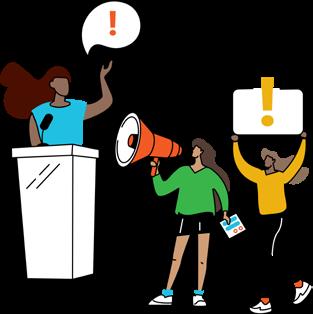
More time:
Many women reflected that it took time to build confidence and trust to openly share their experiences and expressed they wished they had more time in the project to share depth and breadth of experiences and discuss further recommendations.
Many women reflected that regular online meetings including small group discussions and a shared Whatsapp chat provided a fulfilling opportunity to feel connected with a diverse group of women from the comfort of their own home.
Some women attended meetings in shared living spaces while managing family or household responsibilities, which may have limited open group conversations on sensitive topics. Learnings such as this could be included in a Safety Handbook for future projects.
Some women joined the meetings through a mobile phone or shared device, which sometimes limited their full participation. Future projects should include resources to provide laptops to all Community Advisory Group for their period of engagement.
Further Work
Due to limitations in project time, scope, and budget, the Network acknowledges that further consultations are essential to strengthen the evidence base.
Using a trauma-informed approach requires significant time and investment to build rapport, trust, and safety with community members. When consulting with women from refugee and asylum seeker backgrounds, there was not enough time to build the foundation and safety required to explore specific areas of health that were often stigmatised or not openly spoken about, such as disability, sexual and reproductive health and mental health.
The Network also understands from sector consultations that there are sensitive topics related to genderbased, family, or sexual violence that are brought up in confidential health settings and the impacts of these issues on health access.
The Network acknowledges that this project merely scratched the surface of the lived experiences of women from refugee and asylum seeker backgrounds and it is recommended that there are further efforts to engage key demographic groups who were not represented in consultations due to their availability, access or possibly safety concerns.
The Network believes believe there is unfinished work is the following areas:
Experiences of women between the ages of 18 and 25 and women aged 60+
Experiences of women living rurally or regionally
It was hard for everyone to be involved and there was not enough time to listen to everyone.
Some comments couldn’t be explored further due to group size and time. We needed more time to ask “why?’”. In a future project, we would definitely recommend more sessions.
Sometimes there needs to be a health education piece first – more time, learning, discussion – then women feel more able to talk about sensitive topics. It’s about education, rather than shame or stigma.
Health Educator— on reflections on co-hosting a community consultation
Experiences of LGBTIQA+ women, gender diverse and non-binary communities
Sensitive health issues such as sexual and reproductive health and the health impacts of family and gender-based violence
Commonwealth Government issues around Medicare including renewal processes, GP bulk billing and dental subsidies
Experiences of women who are undocumented or other vulnerable temporary visa holders
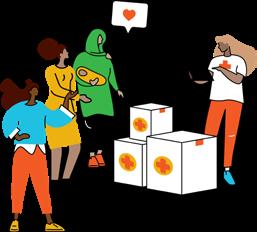
Conclusion
Women from refugee and asylum seeker backgrounds living in Victoria have a diverse range of experiences in accessing and navigating the healthcare system due to a range of various factors, including social determinants of health linked to their settlement journey. Despite various initiatives from the Victorian Government implemented over the years to help reduce health inequity among refugee and asylum seeker communities, services were found to be underutilised by women within these communities.
Throughout this Refugee Women’s Health Community Consultation, women shared how basic healthcare rights such as access and trusted sources of information as well as holistic approaches to health and wellbeing, such as trauma-informed and community-based models of care could assist their communities to improve their access and navigation of the healthcare system in Victoria.
When time is taken to foster safety and trust, women from refugee and asylum seeker backgrounds are motivated to be a voice for their communities, are ready to share their experiences and are determined to be actively involved in building responsiveness and innovation within the Victorian healthcare system.
This project strongly aligns with mission of the Victorian Refugee Health Network to create health equity for people from refugee and asylum seeker backgrounds through collaboration and meaningful engagement. This project worked with community, sector, and government partnerships to jointly identify issues, develop solutions and provide credible and trusted advice to help shape and influence policy and service development.
The Network hopes that this work can support best practice model of care for women, including women from refugee and asylum seeker backgrounds, and supports the Victorian Department of Health’s vision to create a healthcare system that is accessible to all and for Victorians to be ‘the healthiest people in the world’ (Victorian Department of Health Strategic Plan 2023 – 2027).
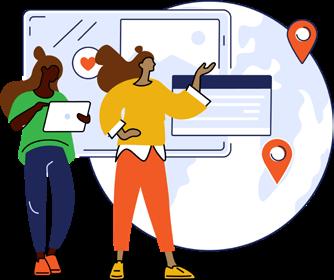
My hope for the future that everyone has a voice, that they can escalate the issues, that community notice that their voice is heard by the government and they are looking for a solution to their issues.
Community Advisory Group Member
I’m hoping that our voice will be heard and there will be a tiny or little improvements from what we pointed out.
Community Advisory Group Member
I hope that this project that the government take this project seriously and that the government will work on it in the short and long term.
Community Advisory Group Member
I hope that this is not the end, that we can connect everyone together and continue this journey.
Community Advisory Group Member
This report was produced by the Victorian Refugee Health Network. The Victorian Refugee Health Network is funded by the Victorian Government Department of Health and auspiced by Foundation House (The Victorian Foundation for Survivors of Torture).
For more information, please visit our website or contact us: refugeehealthnetwork.org.au refugeehealth@foundationhouse.org.au
